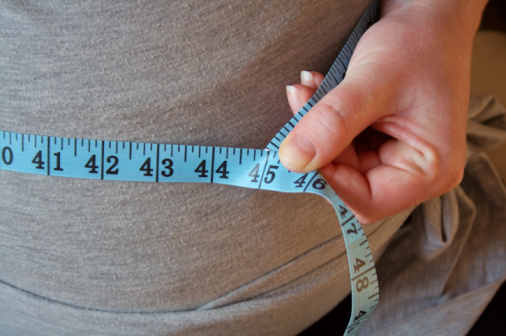
For many, one poorly lit dressing room is all it takes to swear off fatty foods forever. But losing weight isn’t about just about looking better in skinny jeans (although it doesn’t hurt!). More importantly, carrying excess weight is associated with a whole host of health conditions like heart disease, diabetes, high cholesterol, high blood pressure and even some cancers. Scary stuff considering that the latest statistics out of the Centers for Disease Control and Prevention indicate that 69 percent of U.S. adults (20 years and older) are overweight or obese.
Not sure if you fall within that 69 percent? Here’s how to know if you need to lose weight:
Your BMI is 25 or higher.
BMI is a calculation used by health professionals to determine an individual’s weight status and associated risk of disease. Although this number doesn’t paint the whole picture when it comes to your health, it’s a simple way to screen for overweight and obesity. To calculate your BMI, use this formula: weight in pounds/(height in inches2) x 703. If this calculation yields a number between 18.5 and 24.9, you are considered a “normal” or healthy weight. If your BMI is 25 to 30, you are considered overweight. If your BMI comes in at 30 or higher, you are considered obese. The good news is that your BMI is subject to change. The more weight you lose, the lower it goes.
Your waistline.
Your waistline can also tell a great deal about your risk for certain health conditions. If you tend to carry most of your fat around your middle as opposed to your hips, you’re already at an increased risk of developing heart disease and type 2 diabetes. According to The National Institutes of Health, if you’re a woman with a waistline of 35 inches or greater, or a man whose waist measures 40 inches or more, you’re at an even greater risk of developing these conditions. Not sure how your middle measures up? To accurately determine your waist measurement, stand up, place a tape measure just above your hipbones and exhale.
You have certain health conditions.
Being overweight or obese increases your risk of developing high blood pressure, high cholesterol and type 2 diabetes. So if you are overweight, losing a few pounds is a great preventative measure. If you’ve already been diagnosed with these conditions, there’s hope: according to the Obesity Action Coalition, research suggests that losing just 5 to 10 percent of your body weight can lead to significant improvements in these obesity-related conditions.
You have unexplained aches and pains.
If you suffer from knees, hips and back pain, carrying excess weight could be the culprit. According to the Johns Hopkins Arthritis Center, being just 10 pounds overweight increases the force on the knee by 30 to 60 pounds with each step. Plus, the same source says, overweight women have nearly four times the risk of developing a common joint disorder called knee osteoarthritis. Overweight men have nearly five times the risk.
You snore.
If your neighbors need earplugs, you may need to lose weight. According to the American College of Physicians (ACP), people who are overweight have extra tissue in the back of their throat, which can obstruct their airways and block airflow to the lungs during sleep. Many overweight individuals develop a disorder called obstructive sleep apnea—a condition in which the airway blockage causes breathing to repeatedly stop and start. People with this disorder are at risk for a number of other conditions like hypertension (high blood pressure) and stroke. The upside? For those who suffer from sleep apnea, losing just 10 percent of body weight can drastically reduce symptoms like snoring. In some cases, losing a significant amount of weight can even cure the condition. Even for snorers who don’t suffer from sleep apnea, weight loss can bring similar benefits.
Are you ready to lose weight now? Get started with an easy-to-follow weight loss plan from Nutrisystem.















